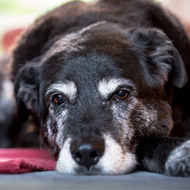
Paper describes abuse case first diagnosed as Legg-Calve-Perthes disease
Veterinary professionals are being urged to be aware of the signs of animal abuse and to understand the link between human and animal abuse.
Writing in the Journal of the American Animal Hospital Association, vets from the University of Georgia’s College of Veterinary Medicine describe a case of animal abuse, which was first diagnosed as Legg-Calve-Perthes disease.
On initial presentation, a dog - a one-year-old male shitzu - was non-weight bearing in the right limb. An ophthalmic exam also revealed a corneal ulcer in the right eye and blood in the anterior chamber.
Radiographs of the right limb indicated avascular necrosis (AVN) on the right hip, with resilient fracture and possible AVN on the left side.
Twenty days later, the dog returned for evaluation of acute lameness in the left leg. Radiographs revealed a left display femur Salter-Harris type II fracture, a non-disposed healing right pubic fracture and a healing right zygomatic arch transverse fracture.
‘The dog's initial injuries were attributed to a routine fall at home, and radiographic interpretation suggested that this was plausible,’ writes author Ira Roth, a clinical assistant professor in the department of small animal medicine and surgery.
'Subsequent patient visits, evaluation of additional injuries, and interviews with the owner indicated that both animal and domestic abuse had occurred. Veterinarians must be alert to recognise signs of animal abuse and must be aware of the connection between animal and domestic abuse'.



 The Veterinary Medicines Directorate (VMD) is inviting applications from veterinary students to attend a one-week extramural studies (EMS) placement in July 2026.
The Veterinary Medicines Directorate (VMD) is inviting applications from veterinary students to attend a one-week extramural studies (EMS) placement in July 2026.